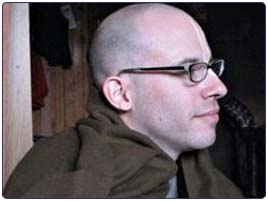New Vrindavana Resident Tries to Put Krishna on Air
By | Фев 12, 2008

Drivers crossing West Virginia who find themselves in the mood for Christian radio are sure to have an ample selection of stations to choose from. Heck, in some zones of the South, it seems as if twangy country, Christian rock and earnest preachers are about all the radio dial has to offer.
In a few years, however, West Virginia radio listeners might encounter a wholly different breed of religious radio—a station whose hosts advocate yoga, vegetarianism and lessons from The Bhagavad Gita. If licensed, this noncommercial outlet could well be the only one of its kind in the country. The applicant is a small group of Hare Krishnas who live in the intentional community of New Vrindaban, near Moundsville, West Virginia.
New Vrindaban was established 40 years ago by the founder of the Hare Krishna religion, A.C. Bhaktivedanta Swami Prabhupada. Today, it’s home to 20 or so devotees, according to Chris Fici, a recent addition to the community who is spearheading the application for a noncommercial station. Another 80 people who live nearby are closely connected to the community, Fici says. In keeping with the tenets of the Krishna faith, New Vrindaban’s residents shun meat, promiscuous sex and intoxicants such as drugs and alcohol. The community is no longer self-sustaining, as it was at its inception, but its residents still grow vegetables on 10 acres of land.
For many outsiders, the community’s biggest draw is its Palace of Gold, an ornate, Indian-style temple that looks entirely unlike anything you’d expect to encounter in West Virginia. Fici says the site is visited by upwards of 40,000 pilgrims and tourists a year, many from India.
If New Vrindaban gets a radio station, its goal would be “to give people a chance, through the programming, to gain spiritual knowledge,” Fici says. Programming might focus on yogic disciplines, gardening and environmental matters, and would help to connect New Vrindivan to the larger non-Krishna community that surrounds it. Ideally, Fici says, New Vrindaban would also broadcast its station via the Internet to reach a worldwide audience.
Fici, 27, is a self-described “aspiring devotee.” He moved to New Vrindaban in November 2006 after learning about the Hare Krishna faith through a student program in Michigan, where he worked in Internet radio. That background, along with his degree in film and video, has made him an apt leader for the group’s effort to get on the airwaves.
Like many other applicants, New Vrindaban faces conflicts with other would-be broadcasters for its desired frequency. The competing applicants include non-local Christian radio groups that already operate stations. Fici is working to gather signatures in support of New Vrindaban’s application and to make a case to the FCC that his group would provide important local content. “These other stations need to share radio space,” he says. “It would be a boon for this community to have this kind of alternative programming.”
If Fici and his fellow devotees prevail, the station would be as singular as their Palace of Gold—not visible, but an aural embodiment of their unique way of life. And, if they achieve their goal of broadcasting online, you won’t even have to visit New Vrindaban to experience it.















